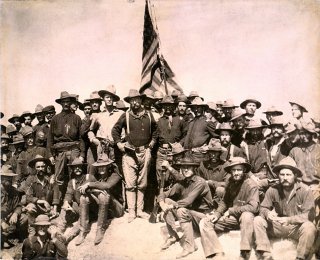The Rough Rider: Could Theodore Roosevelt Have Made America Greater?
A premature death robbed him of the chance.
Let’s close with maritime affairs. How would President Roosevelt have approached an age of naval arms control, and how would he have handled a U.S. Navy that, unlike his modest Great White Fleet, had achieved the stature of a “navy second to none”? In all likelihood, he would have welcomed overtures aimed at curbing a naval arms race among the Western great powers and Japan.
That’s because sufficiency—not global supremacy—represented TR’s watchword in naval strategy and fleet design. Like his sometime friend and confidant Alfred Thayer Mahan, he had long contented himself with a twenty-battleship fleet. Not because that made the U.S. Navy the world’s biggest—far from it during the age of British naval primacy—but because a fleet that size could stand against the largest fraction of a hostile navy that some foreign government might dispatch to the Americas to make trouble for the United States. An American fleet massed in home waters could overpower a fragment of a larger rival navy. That was sufficient.
A navy second to none exceeded the Mahanian standard. So much the better from Roosevelt’s standpoint if a naval accord could be brokered to lock in parity with Great Britain’s Royal Navy and superiority over the Imperial Japanese Navy—as indeed an arms-control treaty negotiated in Washington, DC did by 1922. The Washington Naval Conference, then, may well have gone forward under TR in much the same way it did under Warren Harding. Roosevelt would have been entirely comfortable with the pact—again, provided he satisfied himself that it was enforceable and thus worth more than the scrap of parchment on which it was inscribed.
So . . . my guesswork is that a Theodore Roosevelt v2.0 presidency would have proved less eventful than purveyors of alt-history might posit. It would have taken herculean politicking for him to make it back to the Oval Office in the first place. And if he did, he would have found the political climate far less congenial than in 1901–1909, when he headed an established political party and could use that leverage to move initiatives through Congress. In short, the President Roosevelt of the 1920s would have been an incremental—not revolutionary—chief magistrate.
A status quo presidency? That prospect would dismay the Colonel.
James Holmes is J. C. Wylie Chair of Maritime Strategy at the Naval War College and the author of Theodore Roosevelt and World Order (2006). The views voiced here are his alone. This first appeared in July 2019.
Image: Wikimedia Commons.

